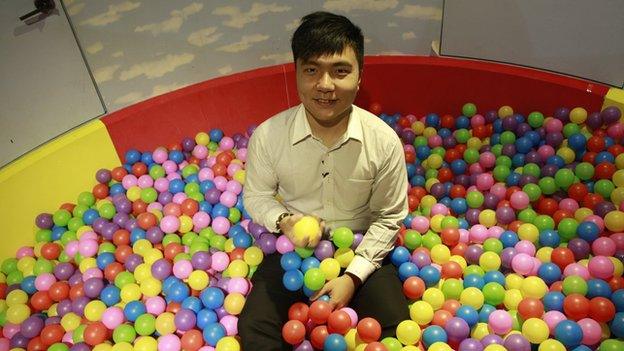Escape games attract Hong Kong youth
- Published
Juliana Liu joins some Hong Kong fans of escape games
When 27-year-old commercial video producer Danny Ip wants to blow off steam, he does not automatically head to the nearest shopping mall or karaoke joint.
Instead the Hong Kong native is fond of frequenting a non-descript office building in the heart of the city's Tsim Sha Tsui neighbourhood.
Inside, behind several doors, he can choose to escape to the old American West, a Chinese Wuxia (martial arts) adventure, a gory haunted house or a cartoon wonderland - but only for 45 minutes at a time.
Mr Ip is a fan of playing real-life room escape games, the latest trend to catch on with Hong Kong's young, technology-savvy generation.
"Hong Kong is a busy city. We don't have much time for leisure," he said after a recent game with three of his friends.
"We always go to the same stuff, like karaoke and bars. It's the same thing over and over again. But this is something new, something different. That is why we enjoy it here."
His friend, Ophelia, agrees: "It's very smart and full of imagination. You trap yourself inside a room and you have to use all your brain juice to come out. I think it is fun."
The group had just successfully solved a series of puzzles and escaped from cowboy country.
In reality, they were playing in a series of three small rooms designed to look like Wild West.
It is the physical equivalent of computer games Mr Ip played as a child. But instead of playing alone, you must join forces with at least one other person, solving riddles and breaking codes as a team.
'Escape from reality'
The games, in either Chinese or English, are being offered by Freeing Hong Kong, the first company in the city to offer room escape games.
It was started less than a year ago by chief executive Raymond Sze and three other partners. They estimate about 100,000 people have played so far.
The company now has locations in five Hong Kong neighbourhoods, as well as Taipei, Singapore, Macau and Guangzhou.
All the games are created in-house by a team of about three dozen developers led by Mr Sze, who is also a 20-year-old student at the Hong Kong University of Science and Technology (UST).
His parents were entrepreneurs, but they did not want the same for their son. Instead, they admonished him to study hard.

Raymond Sze says his parents have begun to support his business endeavours
But Mr Sze, who got his first job at 16, had other ideas. He was dying to start his own business and fulfilled his dream at the age of 19, when Freeing Hong Kong opened.
"One of the reasons they like to play these games is that it provides a different experience for them. Maybe they want to escape from reality, because you know, reality is very stressful and very competitive," Mr Sze says.
"It's not because they need to think about their food or their way to live. It is something about society's expectations. They need to achieve so many things."
Although Hong Kong is one of the wealthiest cities in Asia, its success has made life difficult for many young people, who struggle to land high-paying jobs to get their foot on the property ladder.
The city has some of the most expensive real estate in the world - a recent survey from the Chinese University of Hong Kong suggests salaries are falling far short of property prices.
And locals are increasingly competing against ambitious mainland Chinese and Western expatriates for jobs.
Mr Sze says he wants to create a healthy outlet for players.
"You know, Hong Kong people love computer games and actually they lack communication with their friends or their family. In these games, they need to solve the problems and co-operate with each other," he says.
Gap year
The four founders were friends who loved Japanese comics, mysteries and adventure novels.
It takes anywhere from a week to three months to come up with a concept. Because they get many repeat players, all the games must be updated or replaced regularly.
Mr Sze jokingly calls his school the "University of Stress and Tension", and is currently taking a year off to focus on expanding the firm.
He says he had no idea how to set up a company at first. "I Googled everything: how to start a company, how to get a licence, how to get fire insurance," he recalls, laughing.
The work seems to have paid off, at least personally.
"Actually it was very tough for me at the very beginning, but after a few months, when the game became more popular, my parents started to see the media coverage and said, 'Okay, you can take a gap year for this'."